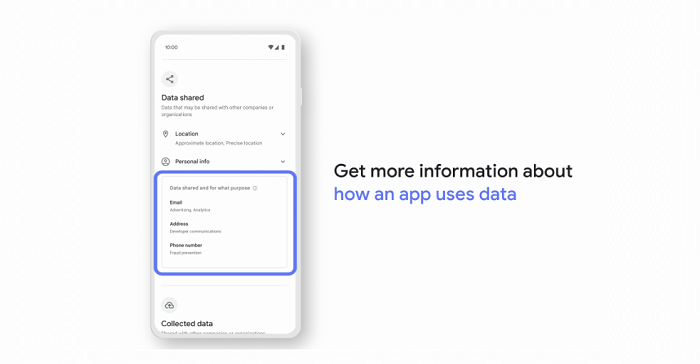SOCIAL
Google Adds New ‘Data Safety’ Labels to Play Store Listings to Improve Data Usage Transparency

Google is rolling out updated ‘data safety’ labels for all apps listed in the Play Store, which will provide more specific info as to how each app collects and utilizes your info, increasing transparency over the process.
As you can see in this example, the new Data Safety section within Play app listings will provide an overview of not only the types of data that each app collects, but how that developer utilizes the information it takes in.
As explained by Google:
“We heard from users and app developers that displaying the data an app collects, without additional context, is not enough. Users want to know for what purpose their data is being collected and whether the developer is sharing user data with third parties. In addition, users want to understand how app developers are securing user data after an app is downloaded.”
The new Data Safety section prompts developers to clearly mark what data is being collected, and signify how it’s being used.
The section will include notes on:
- Whether the developer is collecting data and for what purpose
- Whether the developer is sharing data with third parties
- The app’s security practices, like encryption of data in transit and whether users can ask for data to be deleted
- Whether a qualifying app has committed to following Google Play’s Families Policy to better protect children in the Play store
- Whether the developer has validated their security practices against a global security standard
Developers will be required to complete this section for their apps by July 20th, or they risk penalties, and potentially being unlisted in the marketplace.
It’s the latest data transparency development in the market, following on from Apple’s ATT data-sharing prompts, and Google’s own improved Play Store listings on data usage. Google’s also working to phase out third-party tracking cookies, the next big shift on this front, which will see it move to alternate forms of ad targeting, based on Topics, which could have major impacts on ad targeting accuracy.
Apple’s decision to provide users with more control on this front has already had big impacts, with Meta reporting that Apple’s iOS privacy changes will cost it around $10 billion in 2022 alone. Other platforms have also seen impacts in their ad tools, and while this update will be less disruptive, it’s another factor in the rising data transparency push, that will cumulatively cause major shifts for advertisers over time.
But it makes sense. Data has become the currency of online interaction, and users should have control over such, or at the least, the capacity to fully understand, if they choose, how their personal information is being utilized by advertisers and developers in varying ways.
Which is what this update provides – and again, the impacts here won’t be significant for advertisers, though they may prompt some app makers to scale back their data collection processes, which could have flow-on effects.
Users will start seeing the new Data Safety section within Google Play store listings from today
Source link
SOCIAL
Snapchat Explores New Messaging Retention Feature: A Game-Changer or Risky Move?

In a recent announcement, Snapchat revealed a groundbreaking update that challenges its traditional design ethos. The platform is experimenting with an option that allows users to defy the 24-hour auto-delete rule, a feature synonymous with Snapchat’s ephemeral messaging model.
The proposed change aims to introduce a “Never delete” option in messaging retention settings, aligning Snapchat more closely with conventional messaging apps. While this move may blur Snapchat’s distinctive selling point, Snap appears convinced of its necessity.
According to Snap, the decision stems from user feedback and a commitment to innovation based on user needs. The company aims to provide greater flexibility and control over conversations, catering to the preferences of its community.
Currently undergoing trials in select markets, the new feature empowers users to adjust retention settings on a conversation-by-conversation basis. Flexibility remains paramount, with participants able to modify settings within chats and receive in-chat notifications to ensure transparency.
Snapchat underscores that the default auto-delete feature will persist, reinforcing its design philosophy centered on ephemerality. However, with the app gaining traction as a primary messaging platform, the option offers users a means to preserve longer chat histories.
The update marks a pivotal moment for Snapchat, renowned for its disappearing message premise, especially popular among younger demographics. Retaining this focus has been pivotal to Snapchat’s identity, but the shift suggests a broader strategy aimed at diversifying its user base.
This strategy may appeal particularly to older demographics, potentially extending Snapchat’s relevance as users age. By emulating features of conventional messaging platforms, Snapchat seeks to enhance its appeal and broaden its reach.
Yet, the introduction of message retention poses questions about Snapchat’s uniqueness. While addressing user demands, the risk of diluting Snapchat’s distinctiveness looms large.
As Snapchat ventures into uncharted territory, the outcome of this experiment remains uncertain. Will message retention propel Snapchat to new heights, or will it compromise the platform’s uniqueness?
Only time will tell.
SOCIAL
Catering to specific audience boosts your business, says accountant turned coach

While it is tempting to try to appeal to a broad audience, the founder of alcohol-free coaching service Just the Tonic, Sandra Parker, believes the best thing you can do for your business is focus on your niche. Here’s how she did just that.
When running a business, reaching out to as many clients as possible can be tempting. But it also risks making your marketing “too generic,” warns Sandra Parker, the founder of Just The Tonic Coaching.
“From the very start of my business, I knew exactly who I could help and who I couldn’t,” Parker told My Biggest Lessons.
Parker struggled with alcohol dependence as a young professional. Today, her business targets high-achieving individuals who face challenges similar to those she had early in her career.
“I understand their frustrations, I understand their fears, and I understand their coping mechanisms and the stories they’re telling themselves,” Parker said. “Because of that, I’m able to market very effectively, to speak in a language that they understand, and am able to reach them.”Â
“I believe that it’s really important that you know exactly who your customer or your client is, and you target them, and you resist the temptation to make your marketing too generic to try and reach everyone,” she explained.
“If you speak specifically to your target clients, you will reach them, and I believe that’s the way that you’re going to be more successful.
Watch the video for more of Sandra Parker’s biggest lessons.
SOCIAL
Instagram Tests Live-Stream Games to Enhance Engagement

Instagram’s testing out some new options to help spice up your live-streams in the app, with some live broadcasters now able to select a game that they can play with viewers in-stream.
As you can see in these example screens, posted by Ahmed Ghanem, some creators now have the option to play either “This or That”, a question and answer prompt that you can share with your viewers, or “Trivia”, to generate more engagement within your IG live-streams.
That could be a simple way to spark more conversation and interaction, which could then lead into further engagement opportunities from your live audience.
Meta’s been exploring more ways to make live-streaming a bigger consideration for IG creators, with a view to live-streams potentially catching on with more users.
That includes the gradual expansion of its “Stars” live-stream donation program, giving more creators in more regions a means to accept donations from live-stream viewers, while back in December, Instagram also added some new options to make it easier to go live using third-party tools via desktop PCs.
Live streaming has been a major shift in China, where shopping live-streams, in particular, have led to massive opportunities for streaming platforms. They haven’t caught on in the same way in Western regions, but as TikTok and YouTube look to push live-stream adoption, there is still a chance that they will become a much bigger element in future.
Which is why IG is also trying to stay in touch, and add more ways for its creators to engage via streams. Live-stream games is another element within this, which could make this a better community-building, and potentially sales-driving option.
We’ve asked Instagram for more information on this test, and we’ll update this post if/when we hear back.
-

 MARKETING7 days ago
MARKETING7 days agoThe key to correcting the C-suite trust deficit
-

 MARKETING6 days ago
MARKETING6 days agoA Recap of Everything Marketers & Advertisers Need to Know
-

 PPC4 days ago
PPC4 days agoHow the TikTok Algorithm Works in 2024 (+9 Ways to Go Viral)
-

 MARKETING4 days ago
MARKETING4 days agoHow To Protect Your People and Brand
-

 SEARCHENGINES5 days ago
SEARCHENGINES5 days agoGoogle Started Enforcing The Site Reputation Abuse Policy
-

 SEO5 days ago
SEO5 days agoBlog Post Checklist: Check All Prior to Hitting “Publish”
-

 SEO3 days ago
SEO3 days agoHow to Use Keywords for SEO: The Complete Beginner’s Guide
-

 PPC5 days ago
PPC5 days agoHow to Craft Compelling Google Ads for eCommerce
















You must be logged in to post a comment Login